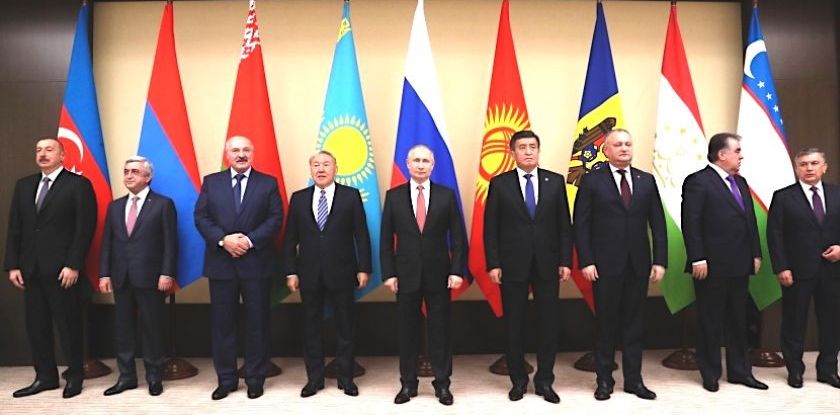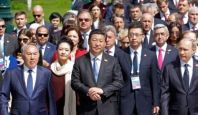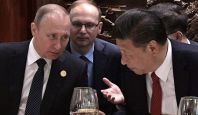Trump’s ascent as the president of US, has negatively affected the advancement of American interests in Central Asia, Russian political analyst Andrey Grozin thinks; in case of further worsening of the conflict between Moscow and Brussels and Washington, its participants will try to lure the states surrounding Russia, on their side, demanding certainty from them, which is like a sharp knife for the region’s elites.
We offer our readers final part of the interview with Andrey Grozin, the head of the Central Asia and Kazakhstan department of the institute of SIC countries. In it we will talk about the influence of the conflict between Russia and the West, on Central Asian countries.

On the beacons of American politics
- There is an opinion that Kazakhstan set its sights on getting close with the US. As proof there is introduction of one-way visa waiver, president Nursultan Nazarbaev’s proposal to Americans to more actively participate in the affairs of the region, which he made during his recent visit to the States, plus an approval of special cargos of US going though Caspian sea. Do you agree with this?
- I think that situation is not that simple, and the talks that the West dreams of the ways to conquer Central Asia, which Russian ultra-patriots like to participate in, are slightly exaggerated. Visits of Nazarbaev, Mirziyoev and others to the US and Brussels among other places, speak of the fact that Central Asian countries are still on the radar of western partners, however the interest in them has waned.
- Why?
- Advancement of American and western interests in Central Asia was affected by the election of Trump. This event has undermined American politics in the region, which was getting shaky under Obama, when US flip flopped between withdrawing troops from Afganistan and growing the contingency. Such, uncertainty affects central Asia. The thing is that this region appeared on the radars of big Western politics only when Afghanistan-related topics came up: whether to send troops, grow numbers, set up central distributive system, etc.
In other words, Afghanistan is primary in American politics in Central Asia. Oil, geopolitics, opposition to Russians, Chinese and Persians are secondary. Thus, whenever Americans figure out their framework for Afghanistan and some practical decisions on it, then maybe Central Asia will be back on the radars.
- Do you think that Americans let go off the idea of creation of “Big Central Asia”?
- The US hasn’t forgotten the legacy of Big CA project, which under state secretary Clinton, transformed into a new Silk way. But for now this is just nice words. Big Central Asia, new silk way hasn’t worked in American version, because American aren’t allocating enough resources into their projects.
- Projects without money – doesn’t sound like Americans.
- I think they have a peculiar approach to projects – they create simulators of a kind in which, if needed they can inject large resources and receive serious institutes for solving of their ongoing needs.
- Does this approach satisfy Central Asian countries?
- Central Asia has absolutely no interest in implementing ideas of the main ideologist of Greater Central Asia project Frederick Starr.
What does project Big Central Asia suppose? It supposes close cooperation with Afghanistan – economic, transport and in prospect military-political one. In other words, American, with their typical pragmatism are proposing to solve economic problems of Afghanistan via economic and financial potential of the region. But in the conditions, when these resources are scarce, clearly nobody will spend money on Afghan peasants. Realistically, Central Asian countries will not integrate their economic systems with Afghan one. The risk is too high in present situation.
- But doesn’t current Trump’s administration have its strategy on Central Asia?
- No, just the travails. Tillerson was going to go on a big tour of Central Asia, but he got fired. The new secretary of state will need time to get Congress’s approval, get acquainted with the situation, get in order dismantled embassies’, whose staff isn’t equipped.
American diplomatic corps in Central Asia, from what I can tell, is in the worst state in the last twenty years, in terms of professionalism and in terms of staffing and work effectiveness. NGOs are complaining that US has significantly cut grant aid as well as government aid. And I assume that if the US continues to retire into itself, trying to become great by cutting partnerships with other governments, then such isolationism will eventually lead to shrinking of US presence in the world.
- Is that bad?
- It will contribute to growth of all sorts of challenges of security. I am not saying that American arbitrage always helped to solve conflicts, but even though shaky and sometimes criminal, it existed. And without it world is risking running into a situation, when the rule of force becomes dominating, and it will be uncomfortable for everyone to live in it. And such world, I think might be quite unstable.
EU is a so-so player
- Not to long ago EU’s new strategy on Central Asia was announced. It is expected to be passed in the second half of next year; can you speculate what it’s going to be like?
- Europeans like to promise a lot, talk about prosperity, peace and friendship, but effectiveness of their actions is much lower than that of Americans. Brussels works well at stamping different strategies and concepts, however these documents are often not fleshed out well.
Sure, EU promised to allocate more money to Central Asian countries than in the past 5 year period, but they seemingly decided to use the small tactics, for example financing of plumbing in rural areas. It is good for citizens, but from the standpoint of stabilizing of situation of the microregion isn’t serious. And the funds aren’t serious either.
- What do you see is attracting Eu to Central Asia?
- Aside from the interests related to Afghanistan, EU is concerned with the resource potential of Central Asia. But for the EU Afganistan’s contingency with Central Asia isn’t as important as it is for the US, even though during the Afghan operation Germans looked at the possibility of expanding of partnership with Uzbekistan with regard to military presence in Termez. But Karimov died, Morziyoev appeared and the Germans are bent on revising their politics. At least German firms are already active in modernizing of infrastructure objects in Uzbekistan.
Overall, however, EU’s policy in Central Asia looks sad. Eu countries cannot develop a single policy even on more vital issues than Central Asia, which while might be interesting, isn’t vital to them. They will take care of domestic problems, Russia, Middle East, North Africa and then possible will take on say, gas project in Turkmenistan. I.e., I think that the West currently isn’t very interested in playing an active role in Central Asian field. But the interest will come, if the conflict with Russia and China will grow.
What is Russia’s conflict with the west fraught with
- Is the conflict between EU and Russia dangerous for CA?
- Political crisis in relations with Moscow will prompt parts of western elite to stir up situation in CA, to create problems for Russia. There is nothing technologically difficult in it, especially since certain elements of instability are already present in some states of this region, borders between CA countries transparent, and thus problems of one will quickly become the headache.
I think that realization of this threat, helped the creation of Tashkent’s initiative to call for an advisory council in Astana, which hasn’t concluded in anything yet, but as people say, has a potential. This initiative played well into Mirziyoev – experts say that a new leader is emerging in CA and he is being attentively and amicably sized up by leaders of other countries.
- What is the reason for such friendly interest?
- Everyone wants to participate in opening up of the Uzbek economic new ground, thus the West, Chin and Russia are closely observing the changes that are happening in Uzbekistan. Foreign colleagues, with whom I’ve talked in the past half a year both from the West and the East – are primarily interested in Tashkent’s affairs. And before – you remember? – the most important issue for experts on CA was the transit of power in Kazakhstan and Uzbekistan. But when Tashkent demonstrated, that this issue can be solved without inner political conflicts, an interest occurred in prospects of Uzbekistan as a regional leader and economic partner, capable of having a leading role in consolidation of the region and securing its safety.
- Is there a chance that Uzbekistan will live up to these expectations?
- If its political system gets rid of imbalances, that happened during Karimov’s times, the steps to liberalize the economy will become possible, which in turn will allow Uzbeks to attract large investors, having intercepted a shrinking flow of investments from their neighbors. Of course they likely won’t like it. But the West is interested in participating in the captivating process of privatization of Uzbek assets.
- But after all is the conflict between Russia and US, Russia and EU affecting the Central Asian countries?
- Absolutely, because the whole world is inter-related. I think that the conflict between Russia and the West is far from over, and do not exclude either the possibility of further escalation or the possibility that countries will decide to drop it. Central Asian countries are of course interested in their main partners having more or less normal relationships – the conflict between world centers of power creates more troubles and inconveniences than prospects and opportunities.
In case of further escalation of conflict between Moscow and Brussels and Moscow and Brussels, however, its participants will try to lure Russia-surrounding states to their side, demanding certainty from them, which for Central Asian elites is tantamount to a sharp knife, i.e. ending up clenched by unipolar dependency is unacceptable. It is unacceptable because such situation – is a shrinking of possibilities for maneuvering. And they want to escape the question of “Who are you with, wherever it may come from – Kremlin or the white house.
- Thank you for your comments, Andrey Valentinovich.






